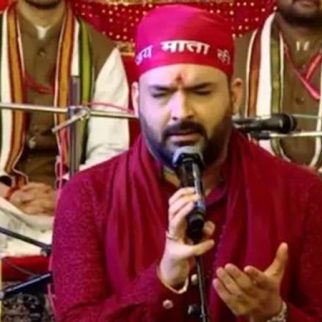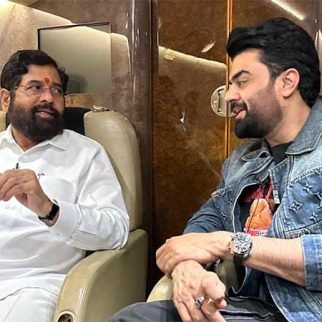
Anup Singh's second feature film Qissa has cast a mesmerizing spell on the discerning audience. In an exhaustive and illuminating interview with Subhash K Jha he discusses his art, film, and indelible affinity to the Great Indian Heritage.
The fierce originality of your second feature film leaves audiences mesmerized. How & why did you make Qissa?
It has a lot to do with stories. Why have we been telling each other stories since time immemorial. My grandfather, for instance, all that had been left to him, all that he could call his own, were his stories. He was one of the millions of refugees created by the 1947 partition of India. For people like him, for those who were displaced, for their children and grandchildren, stories are a link to lost forefathers, lost fragrances of hills and rivers and fields, lost homes and countries. Stories are all that are left to them to link them to a family or a community. These stories were everywhere in my childhood. Because of my grandfather, I was surrounded by refugees. But amongst all the stories, there is one that stayed with me and has a lot to do with this film. It was told to me by a very old man. Many women, as you know, would jump into wells rather than risk rape when their village was attacked during the partition. His daughter, hardly a teenager, had jumped into the well too and, now, sixty years later, he still dreams about her. He told me that in his dream he sees her in the well, looking up at the circle of sky above her, waiting for him, her father, to come save her. This story was one of the starting points of Qissa. As you can see, the strange thing with these stories is that they start as very real tales, traumatic memories, but often veer off into the imaginary, as if to affirm that something else could have happened, that, perhaps, somehow their lost daughters, sisters, brothers were still living some other life. I really wanted this quality of a fable for Qissa, but without directly telling you that this is a fable. This film is personal on one level but it also deals with this wound in the memory of our nation that keeps on getting pricked and prodded.
It's been a long, hard struggle for you to complete & release the film. Why do you think a film as meritorious as Qissa must go through by the ordeal by fire before emerging triumphant?
I think Qissa is a very gentle film even though it deals with the tremendous violence of our time. It speaks with music and nuances, rather than high-speed action. It speaks with light and shadows and whispers and slowly enters a viewer's deepest being. I think a film like this is bound to take some time, then, to reach its audience. It takes time for a viewer to begin to articulate how he or she have been affected, but as you can see now with the release of the film in India, steadily the word of mouth is growing. I find that more satisfying than the abrupt satiation some other films offer but that you forget as soon as you're out of the theatre. Many, many people who have seen Qissa have told me that Qissa continues to haunt them long after they have seen it.
Gender ambivalence & patriarchal dominance are the two ongoing themes of Qissa. How far are you influenced by films like Boys Don't Cry and Bol?
Unfortunately, I've seen neither of the two films. But, as you know, our Eastern traditions are suffused with ideas of gender play - think of Shiv-Shakti, for example, or the various tales in A Thousand and One Nights.
You are passionately influenced by Ritwick Ghatak …Do you consciously imbibe his influence into your art?
Passion is more a gift, I think, than something imbibed consciously. Ritwick Ghatak taught for many years at the Film & TV Institute of India, Pune, but as a teacher as well as a filmmaker he taught one thing again and again: think independently about everything. That's what we take from him, those of us who consider ourselves his students. What I also learned from him is that skill or technique are undoubtedly important, but what cinema really demands is a fearless questioning of all taboos, whether these be moral, political, or about human relationships. It is Ritwik Ghatak who asked us in his cinema again and again, "Who is not a refugee?" I believe it is this question that has made my cinema a cinema of questions, a cinema that seeks to challenge all kinds of borders, a cinema that seeks to keep itself open to the multiple possibilities of the human spirit and our world.

What do you think of contemporary Indian cinema and who according to you are the directors to watch?
It's an exciting, emergent time for independent young filmmakers in India. More and more indie films have begun to challenge what is familiar. They are provocative. They challenge not only our habitual ways of watching a film, but also our fixed ways of thinking about love, man, woman, morality and conventions. For example, while mainstream cinema keeps affirming certain outrageous conventions that women need to follow, the new Indie films not only question these conventions, but show them for the repressive and violent tools of power that they secrete. If the general belief in the mainstream film industry is that films should not provoke the audience, should not make it ask questions, indie films do exactly the opposite! I think more and more what Indian indie films are attempting is to bring a voice of conscience back into Indian cinema. No more false moralities, irresponsible sexist characterizations, bad, melodramatic performances being passed as authentic expression, but greater rigour of not only thought but in the very art of filmmaking! What is exhilarating about young filmmakers today in India is that they are so varied in their thinking and approach. Look at the fiery conscience of the film Court made by this very young filmmaker, Chaitanya Tamhane. Think of the hermetic Amit Dutta, the rigorous Gurvinder Singh and the vibrant works of Anurag Kashyap! There are so many others. It's really a time to celebrate our young filmmakers. The world has already started doing that!
Tell me about your remarkable cast from Irrfan to Tillotama to Tisca … How did you pick them? And where did you find the resplendent Rasika?
The main theme of Qissa is borders. How borders of all kinds trigger violence. That's the main reason I cast Irrfan. I believe as an actor he comes to a role in the same way that a refugee comes to a new country. Just like a refugee, Irrfan seeks to understand the complexities of the new circumstances and his relationship with it and his own growth within the new space. That is what makes him the immensely innovative actor that he is.
For instance, let me tell you about how he learned for himself to speak the Punjabi dialogue of Qissa and developed his approach to the character of Umber Singh. At one point, Irrfan stopped learning the lines by rote. He began to hum for himself the feeling of the scene. He would hum a phrase and then another, seeking the inner, hidden emotion of the character at that moment. And, then, slowly, he would allow the words to emerge within the music of the moment he had created for himself. His quest remained to find the lilt and the rhythm of the language and then the words would rise spontaneously, and authentic within the scene.
And Rasika -- what I noticed immediately in my auditions with Rasika is that in her every move there is no evasion of life. She does not close herself and build a character with familiar expressions, tics and gestures. She opens herself like the wind and takes all in her path. She accepts everything that comes in her way -- the dupatta caught on a thorn, the unforeseen violence of a co-actor's look, an off-screen disturbance -- and thus till the end she remains free and continues to surprise. She brings us the experience of the mystery that we eternally remain to ourselves.
Tisca Chopra has the kind of serene beauty that one sees in the films of the 40s and 50s. She reminded me of my mother as I remember her from my childhood. Tisca Chopra's role in Qissa complements Irrfan's character. If he's Tandava, she's Lasya (the gentle dance of Parvati). Tisca is like a very delicate musical instrument. She needs just a fragile breeze to disarrange with an almost uncanny frisson and resonance a viewer's logic of feeling. She can take you into a realm of emotion that you would simply not expect. She can suggest an emotion simply by a shift in her breath. You can't always see what she's doing, but you can feel and sense it. As an actress, she's pure music.
As for Tillotama, she was suggested by a friend and came for an audition. As soon as I saw her, I had a strange emotion. You know sometimes when you see a bird high in the air and it opens its wings to surge higher? You feel a sensation as though the opening of the wings has expanded the sky. That's the feeling I had with Tillotama. Her very first gesture in our audition made me feel as though the air had expanded in my chest!
The thing about Tillotama as an actress is that she disappears into her character. She's vanishes, and this strange and familiar figure, which was just words on paper, is suddenly before you. Without you knowing, she draws you into her story, her yearning, her exhilaration. As an actress she gives you her inner universe with such ease and generosity that you realize only much later what a profound gift you've been given. When performing, she's like a young tree that does not seem to be moving, and yet look again and you'll see all the leaves astir and glimmering.

How much of Qissa would you say is inspired by real life?
There are aspects of the story inspired by real life. The character of my grandfather helped me write the role of the father, which is played by Irrfan Khan in Qissa. Many of the partition stories I heard from him and relatives also helped immensely to give flesh to the story of Qissa.
Some critics have a problem with the last interlude of Qissa when Irrfan's character turns into a ghost? Your comments?
Qissa brings together innumerable journeys. For instance, the qissa form that we're familiar with in the Punjab (Heer Ranjha, Mirza Sahiba) celebrates the exuberant meetings of Sufi mysticism and local spiritual traditions. Journeys, meetings, partings are at the heart of these qissas. Qissa encourage us to cross all kinds of borders. The very theme of the film is partition. Partitions of all kinds - of nations, body and gender, inner and outer truth, life and death. And we know how these violent separations are used to label and define things and people -- to put them in a predetermined place, to make them easier to control and to exploit. This theme of the film led me to choose to challenge all notions of not only a fixed genre, but also ideas of how a plot needs to resolve itself. Too often we seek a resolution that assuages our fears, an ending that brings order to the chaos that we see around us.
To me, this false moral ordering of our experience is a venal deception. In fact, I believe it belittles us as human beings. I believe Qissa unfolds those secret and fragile aspects of our life that are usually very hard to share in our daily life. That part of us that suffers but also that which affirms. After all, who is there amongst us who is not filled with a certain melancholy when remembering a lost childhood? Who is there who has not sacrificed a part of themselves for their family? Who is it that does not live with the memory of a lost love?
These are the ghosts that all of us carry within ourselves. It has nothing to do with faith or superstition; ghosts are all our secret crimes, our bitter losses and our venal compromises with our own possibilities. Are these not ghosts that we carry within us?
And, more, the 1947 partition of India and the horrific butchering of half a million people that it led to remains a ghost in both India and Pakistan's conscience. We're all possessed with some kind of ghost. These ghosts return again and again to tell their story.
Finally your closing thoughts about your masterpiece finally making it into theatres?
To screen Qissa in the country where the film's very light and voice rise from is an exultant moment for me. It's not an easy film and it needs to find its audience, but NFDC has tremendous faith in the film and are looking at innovative ways to bring the film to its audience. That is why they've chosen to release simultaneously on VoD, DVD and theatrically. We are hoping that all kinds of audiences will want to see the film.
BOLLYWOOD NEWS - LIVE UPDATES
Catch us for latest Bollywood News, New Bollywood Movies update, Box office collection, New Movies Release , Bollywood News Hindi, Entertainment News, Bollywood Live News Today & Upcoming Movies 2024 and stay updated with latest hindi movies only on Bollywood Hungama.





